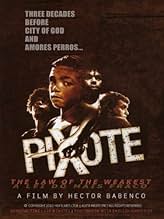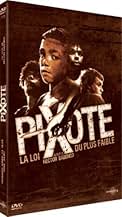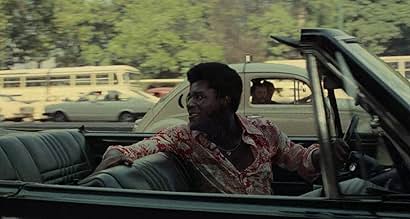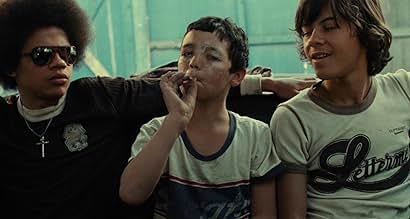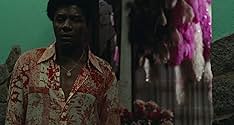IMDb RATING
7.9/10
10K
YOUR RATING
The life of a boy on the streets of Sao Paulo, involved with crimes, prostitution, and drugs.The life of a boy on the streets of Sao Paulo, involved with crimes, prostitution, and drugs.The life of a boy on the streets of Sao Paulo, involved with crimes, prostitution, and drugs.
- Awards
- 10 wins & 4 nominations total
João José Pompeo
- Almir
- (as Joáo José Pompeu)
Rubens Rollo
- Director
- (as Ruben Rollo)
Luis Serra
- Reporter
- (as Luiz Serra)
Featured reviews
Amazing, controversial, and painful are some essential adjectives to allocate this important piece of art, that depicts the searing and factual adolescence of the marginalized children; i.e. victims of our global village.
Pixote prepubescent, with the unflinching stare of the innocent-all-knowing, left an impression of raw truth in finding credence to the old African saying, "It takes a village to raise a child". The awful reality, though, that director Hector Babenco visualized is that Brazil, with it's confusing, twisted, and socio-economic disparity, is the cause of this robbed innocence. In desperation, we see these children in search of nurturing and love, but only permitted leftovers of what society has tossed aside. Institutionalized rape, prostitution, drug dealing, and murder are the only voice they have in order to be nurtured, be loved, and have power. The only thing that Brazil has to offer these lost children are predators; repeating the cycle of hopelessness. Brazil, as a nation is an unworthy parent.
In retrospect, I believe the film "Pixote" is a parable on the world governments turning a blind eye to the hunger pains of the destitute and impoverished victims of an ever-expanding economy; and the force of irresponsible globalization is leaving blood soaked tear trails of destruction through the interconnected avenues of the world. We see through the symbolism of a child that the inequality or disparity in society has a snowball effect causing cannibalism within ourselves.
Pixote prepubescent, with the unflinching stare of the innocent-all-knowing, left an impression of raw truth in finding credence to the old African saying, "It takes a village to raise a child". The awful reality, though, that director Hector Babenco visualized is that Brazil, with it's confusing, twisted, and socio-economic disparity, is the cause of this robbed innocence. In desperation, we see these children in search of nurturing and love, but only permitted leftovers of what society has tossed aside. Institutionalized rape, prostitution, drug dealing, and murder are the only voice they have in order to be nurtured, be loved, and have power. The only thing that Brazil has to offer these lost children are predators; repeating the cycle of hopelessness. Brazil, as a nation is an unworthy parent.
In retrospect, I believe the film "Pixote" is a parable on the world governments turning a blind eye to the hunger pains of the destitute and impoverished victims of an ever-expanding economy; and the force of irresponsible globalization is leaving blood soaked tear trails of destruction through the interconnected avenues of the world. We see through the symbolism of a child that the inequality or disparity in society has a snowball effect causing cannibalism within ourselves.
Pixote is probably the most powerful film I have ever seen. An aspect so rarely attained in most films is the gritty reality that Babenco exposes with paramount ability and care. It truly will stay with you forever--you will be touched in such a deep way no matter who you are, no matter where you're from, no matter what movie genre you favor.
Considering that Da Silva's own life was one of the streets, leading to an early death at nineteen, when he was killed by corrupt cops in a drug raid, the film becomes all the more disturbing when we realize that Da Silva truly is Pixote in a circle of life imitating art imitating life.
With no reliable source of aide, these street kids are forced to exist at a most extreme disadvantage. The brutal truth in this film may be difficult to digest, but we can't turn a blind eye. Ultimately, words aren't strong enough to do this film justice, you'll have to experience it yourself.
Considering that Da Silva's own life was one of the streets, leading to an early death at nineteen, when he was killed by corrupt cops in a drug raid, the film becomes all the more disturbing when we realize that Da Silva truly is Pixote in a circle of life imitating art imitating life.
With no reliable source of aide, these street kids are forced to exist at a most extreme disadvantage. The brutal truth in this film may be difficult to digest, but we can't turn a blind eye. Ultimately, words aren't strong enough to do this film justice, you'll have to experience it yourself.
Perhaps the most brutal filmic portrait of youth ever made; Charles Dickens meets Hieronymous Bosch in this tale of a group of boys struggling to survive in the reformatories and mean streets of Brazil as the cycle of prey transformed into predators is documented.
The saddest detail is to realize that this film, made almost twenty five years ago, documents a world that in terms of its poverty and depravity, has apparently changed very little. A brutal reality captured here but with some of the most layered acting I've ever seen in the history of film by a group of amateurs picked from the streets of Sao Paulo with no previous experience. Not one or two good performances, the entire cast is quite simply remarkable, and even sadder is the fact that most of them have probably now been swallowed by the street life they portrayed.
Not as sophisticated a vision as Bunuel's 'Los Olvidados' or as sensational as Clarke's 'Kids,' but in this genre of 'children growing up in the streets' it is easily the most emotionally powerful film of them all.
The saddest detail is to realize that this film, made almost twenty five years ago, documents a world that in terms of its poverty and depravity, has apparently changed very little. A brutal reality captured here but with some of the most layered acting I've ever seen in the history of film by a group of amateurs picked from the streets of Sao Paulo with no previous experience. Not one or two good performances, the entire cast is quite simply remarkable, and even sadder is the fact that most of them have probably now been swallowed by the street life they portrayed.
Not as sophisticated a vision as Bunuel's 'Los Olvidados' or as sensational as Clarke's 'Kids,' but in this genre of 'children growing up in the streets' it is easily the most emotionally powerful film of them all.
The violent death of Fernando Ramos Da Silva only eight years after the completion of this film, only adds to the poignancy of dierector BAbenco's powerful message. The film is split into two halves - the first in a reformatory where a group of youngsters are abused and violated by the violent law enforcers and guardians. The second backdrop is the city where they are confined instead by their own actions and morality, which includes mugging, pimping and killing different characters who enter their lives.
The differing gender and sexual roles in the film allow for constant changes in the characters as they interact with other people. Particularly interesting is teh character of Lalica, a transvestite who is mother and lover to some of the children. Her reaction to the arrival of Sueli, a prostitute is both poignant and tragic.
There is no happy ending to this story and i reccomend to watch it with caution as there are some very uncomfortable scenes to watch especially in teh opening twenty minutes. But whilst watching it, it is important to remember that this is not just a fictional tale. The actors are not trained professionals but instead boys selected from the streetsof Sao Paulo. They actually lived this life that is portrayed so vividly on screen and in da Silva's case, died at the hands of the police who are depicted so brutally. A documentary? A piece of fiction. It borders on both but it certainly makes for heart wrenching material and is a film that actually leaves you breathless and thinking long after having watched it.
10/10
The differing gender and sexual roles in the film allow for constant changes in the characters as they interact with other people. Particularly interesting is teh character of Lalica, a transvestite who is mother and lover to some of the children. Her reaction to the arrival of Sueli, a prostitute is both poignant and tragic.
There is no happy ending to this story and i reccomend to watch it with caution as there are some very uncomfortable scenes to watch especially in teh opening twenty minutes. But whilst watching it, it is important to remember that this is not just a fictional tale. The actors are not trained professionals but instead boys selected from the streetsof Sao Paulo. They actually lived this life that is portrayed so vividly on screen and in da Silva's case, died at the hands of the police who are depicted so brutally. A documentary? A piece of fiction. It borders on both but it certainly makes for heart wrenching material and is a film that actually leaves you breathless and thinking long after having watched it.
10/10
When one thinks of the Brazilian cinema it is this film Pixote which comes to mind. Hector Babenco gives us one uncompromising and brutal look at the lives of the street boys in Brazil's largest city Sao Paulo. One only hopes that it is 35 years since Pixote was released and the hope is things have improved for these kids who have to grow up way before their time.
The films centers on the title character played by a young actor who himself never made it out of the slums. Babenco used real street kid Fernando Ramos DaSilva as the ten year old Pixote who was killed at the age of 19 in a homicide that still raises questions. One thing this film does show is that Anglo-Saxon jurisprudence didn't make it to Brazil, especially for the young.
We see things in Pixote that you would never see in American cinema portrayed even now. Rape in a juvenile detention center is the established norm here, especially when it involves Jorge Juliao, a young cross dressing street kid. When the slightly older Gilberto Moura uses sex to assert authority over Juliao it's both frightening and touching. Poor Juliao has one rotten opinion of his own self worth from his experience. One gets the impression that home wasn't all that much better. But these things were being shown way before America even knew there were transgender issues. Juliao even more than DaSilva is who you remember from Pixote.
35 years later Pixote is a powerful and disturbing film.
The films centers on the title character played by a young actor who himself never made it out of the slums. Babenco used real street kid Fernando Ramos DaSilva as the ten year old Pixote who was killed at the age of 19 in a homicide that still raises questions. One thing this film does show is that Anglo-Saxon jurisprudence didn't make it to Brazil, especially for the young.
We see things in Pixote that you would never see in American cinema portrayed even now. Rape in a juvenile detention center is the established norm here, especially when it involves Jorge Juliao, a young cross dressing street kid. When the slightly older Gilberto Moura uses sex to assert authority over Juliao it's both frightening and touching. Poor Juliao has one rotten opinion of his own self worth from his experience. One gets the impression that home wasn't all that much better. But these things were being shown way before America even knew there were transgender issues. Juliao even more than DaSilva is who you remember from Pixote.
35 years later Pixote is a powerful and disturbing film.
Did you know
- TriviaThe film's star, Fernando Ramos da Silva, who plays a young street criminal, actually was a street criminal before he made this film. After completing it, he took up the criminal life again, and was killed in Brazil in 1987 in an alleged shootout with police. While police reports claim that da Silva was resisting arrest, there are conflicting reports from eyewitnesses, who claim da Silva was unarmed. Furthermore, a forensic examination showed that he had been shot while lying on the ground. Both his wife and mother called the shooting "a police execution." The story of Fernando Ramos da Silva is depicted in the biographical film Quem Matou Pixote? (1996).
- Alternate versionsAll UK versions were cut by 27 secs under the 1978 Protection of Children Act. The scene removed was a panning shot showing Pixote on a bed alongside a couple having sex.
- ConnectionsFeatured in Sneak Previews: Pixote, Ragtime, Buddy Buddy, Absence of Malice (1981)
- SoundtracksCould It Be Magic
- How long is Pixote?Powered by Alexa
Details
Contribute to this page
Suggest an edit or add missing content


